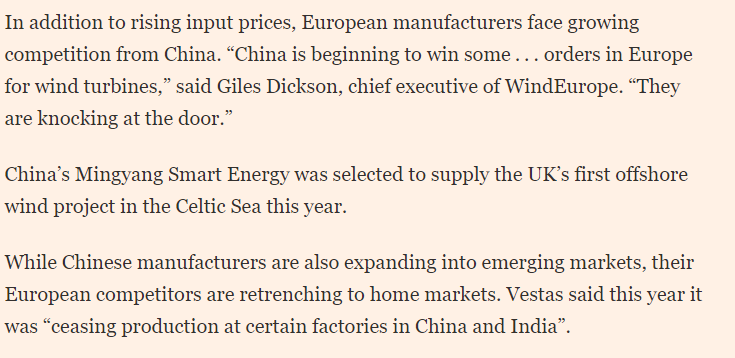Thread by Brad Setser
- Tweet
- Jan 25, 2023
- #PoliticalEconomy #Inflation #Europe
Thread
European criticism of the Inflation Reduction Act's narrow definition of friend-shoring isn't a surprise.
But it is strange that most of Europe now believes the IRA is a massive threat to European industry, while even more discriminatory Chinese policies are largely ignored
1/
But it is strange that most of Europe now believes the IRA is a massive threat to European industry, while even more discriminatory Chinese policies are largely ignored
1/
Statements like those of Belgium's PM are common -
"Alexander De Croo told a meeting at the [EU] parliament on Tuesday that the US was seeking to undermine EU industry"
(Belgium is known to use tax breaks to lure industry by the way/ see pharma)
www.ft.com/content/16816444-1694-4530-84bb-ac289d6776dd
2/
"Alexander De Croo told a meeting at the [EU] parliament on Tuesday that the US was seeking to undermine EU industry"
(Belgium is known to use tax breaks to lure industry by the way/ see pharma)
www.ft.com/content/16816444-1694-4530-84bb-ac289d6776dd
2/
There is no doubt that the Inflation Reduction Act discriminates in favor of North American EVs and batteries ...
But how is it different from China's very similar (if not more restrictive) policies that made China's EV industry an export powerhouse?
3/
But how is it different from China's very similar (if not more restrictive) policies that made China's EV industry an export powerhouse?
3/
The US affirmative discrimination in favor of North American production (and the use of materials in FTA partners for batteries) is written into the law.
China simply never qualified imported cars or imported batteries for its subsidies list --
4/
www.wsj.com/articles/chinas-road-to-electric-car-domination-is-driven-in-part-by-batteries-1508587203...
China simply never qualified imported cars or imported batteries for its subsidies list --
4/
www.wsj.com/articles/chinas-road-to-electric-car-domination-is-driven-in-part-by-batteries-1508587203...
In fact, China didn't initially qualify Chinese made batteries for its tax credits unless the batteries were made by a Chinese firm. Korean firms producing batteries in China weren't able to qualify (initially) -- which favored Chinese car marks over foreign marks
5/
5/
And then China selectively approved cars made in China with batteries made in China (but by foreign firms) for its list -- initially favoring Chinese owned Volvo
6/
www.wsj.com/articles/power-play-how-china-owned-volvo-avoids-beijings-battery-rules-1526551937
6/
www.wsj.com/articles/power-play-how-china-owned-volvo-avoids-beijings-battery-rules-1526551937
The WTO case against the US may be stronger b/c the US requirements are transparent and explicit --
But China's actual policy was far more discriminatory -- as it favored Chinese owned firms producing in China over foreign owned firms producing in China ...
7/
But China's actual policy was far more discriminatory -- as it favored Chinese owned firms producing in China over foreign owned firms producing in China ...
7/
Europeans are also concerned about the combination of subsidies for the deployment of wind and solar in the IRA, which are linked -- at least partially -- to some local content requirements.
But how is that different from any Chinese policy?
8/
But how is that different from any Chinese policy?
8/
China subsidized the buildout of its solar cell industry massively (and favors local cells in its domestic solar plants) -- and in the process became the whale of solar PV manufacturing/ related supply chains
9/
www.visualcapitalist.com/visualizing-chinas-dominance-in-the-solar-panel-supply-chain/
9/
www.visualcapitalist.com/visualizing-chinas-dominance-in-the-solar-panel-supply-chain/
China forced European wind power manufactures to localize production in China to have a chance at getting wind contract from its state owned electric companies -
Vestas did so in a big way back in 2009
10/
www.ft.com/content/e169786a-2aa9-11de-8415-00144feabdc0
Vestas did so in a big way back in 2009
10/
www.ft.com/content/e169786a-2aa9-11de-8415-00144feabdc0
But over time Vestas (and Siemens) were still squeezed out of the Chinese market, and now face growing Chinese competition in their home market
11/
www.ft.com/content/24367f1e-db33-4eda-8f72-d668be4bb000
11/
www.ft.com/content/24367f1e-db33-4eda-8f72-d668be4bb000
So I understand why Europeans could worried when the world's largest importer of manufactures decides to match the clean energy production subsidies (and EV credits) of the world's biggest manufacturing exporter and incumbent industry leader ...
12/
12/
But I don't understand why Europe isn't equally worried by substantively equivalent (or worse, for foreign firms) policies from China even if they are not explicit WTO violations.
Especially when Chinese EV and wind imports are current threat.
www.wsj.com/articles/world-trade-organization-sidelined-11673629991
13/
Especially when Chinese EV and wind imports are current threat.
www.wsj.com/articles/world-trade-organization-sidelined-11673629991
13/
I also find arguments that the IRA is misguided and the US is failing to capture the benefits of free trade by not importing Chinese wind and solar a bit rich, given the legislative history (so to speak) of China's current dominance in these sectors ...
14/
14/
(and, for what it is worth, I do think the US should try to find common ground -- to the extent possible under the law -- with the EU on these issues, and expand the circle of friends who benefit from the US shift toward clean energy subsidies)
15/
15/
But the quality of the EU argument would be strengthened if they recognized that both the US and China are now providing somewhat discriminatory subsidies for EVs and green energy --
and that the EU is the odd big economy out right now
16/16
and that the EU is the odd big economy out right now
16/16
p.s. the notion that the US can afford the IRA while the EU cannot is patently ridiculous. The IRA's subsidies ($400b over 10ys) are about 15 bp of US GDP.
The EU's fiscal constraints here are ENTIRELY self imposed
www.politico.eu/article/netherlands-prime-minister-mark-rutte-europe-frugal-us-subsidies-loan-reform/...
The EU's fiscal constraints here are ENTIRELY self imposed
www.politico.eu/article/netherlands-prime-minister-mark-rutte-europe-frugal-us-subsidies-loan-reform/...
Mentions
See All
Michael Pettis @michaelxpettis
·
Jan 26, 2023
Good thread by Brad Setser. There's something surreal about surplus countries seeking to roll back the "protectionist" policies of deficit countries. It is only their own beggar-thy-neighbor policies that create the large, persistent surpluses that undermine global trade.

